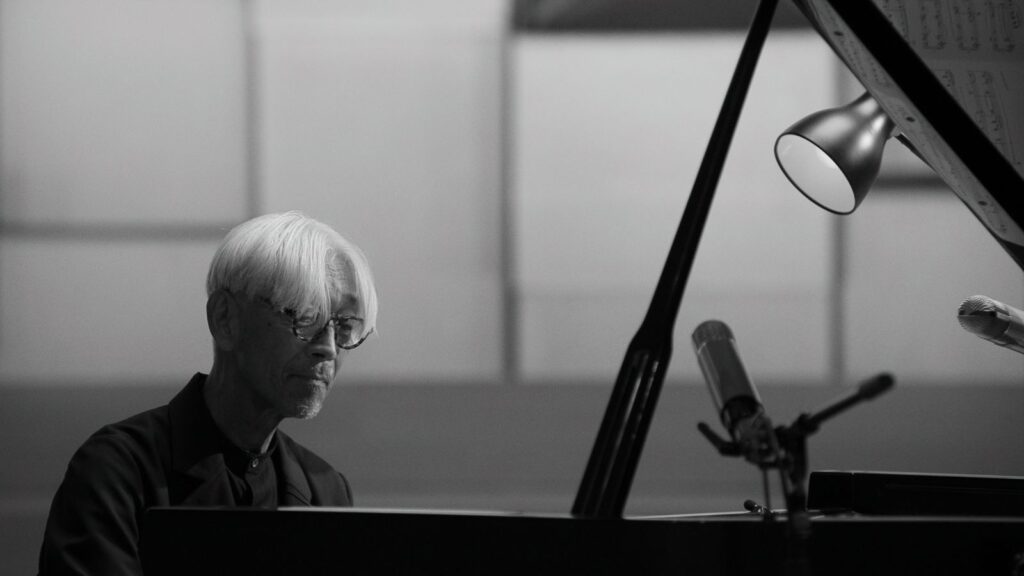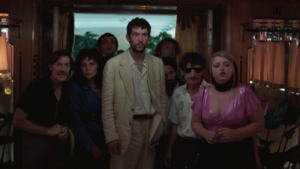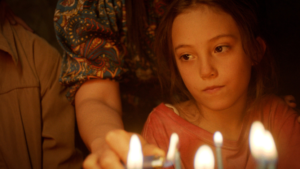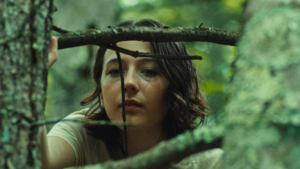
After setting the over/under at 15 minutes, I lost the wager in my mind: It didn’t take that long for the first person to walk out.
The Milwaukee Film Festival’s annual Super Secret Members-Only Screening is always a gamble. Without knowing which movie would show, hundreds of dues-paying members of Milwaukee Film, the nonprofit organization that runs the festival, gathered April 17 at the historic Oriental Theatre. The large crowd buzzed with anticipation. Would it be an international drama? A poignant documentary? A side-splitting comedy?
“This year we aimed high,” Interim CEO Anne Reed told me before the screening, with a faint hint of apprehension that proved prescient.
Even though Membership Director Kristopher Pollard tried to prime the room, many viewers were unprepared for “Ryuichi Sakamoto: Opus,” a farewell concert film in which the revered Japanese composer plays his best-known classical works mere months before he would die from cancer. The movie opens with a sustained shot of Sakamoto at the piano, back turned to the camera, mustering just enough strength to perform his delicate, plaintive compositions. There are no explanations, no interviews, no plot twists. It’s just a man and his melodies.
The minimalist documentary was a gutsy choice for the secret screening—be proud, Milwaukee Film!—but perhaps it was too melancholic, too niche for an audience that signed up for a conventional surprise. Once the walkouts started, it became an exodus. As people bailed, their counterbalanced seats would flip upright. That mild clanking became so persistent for the next 90 minutes that the metallic reverberations began to synthesize with Sakamoto’s music to create a strange, somber concord of sound.
Those that stayed were treated to an intimate portrait of a very sick man using his fingers to reflect on his life and career. Recording in dynamic 4K monochrome that captures the silvery beauty of Sakamoto’s white hair, white lamp, white backdrop and white piano keys, the camera shifts between elegant tracking shots, forthright close-ups and disorienting images that always complement Sakamoto’s music, including his scores for movies like “The Last Emperor” and “The Sheltering Sky.”
Sakamoto is clearly moved by the opportunity to communicate through these pieces one final time, and that makes watching and hearing this movie a stirring experience, too. When he says he needs a break, the exhaustion is palpable. When he makes a mistake, the humanity is overwhelming. Contrary to those who griped the movie has “no story,” the film tells the tale of a man grappling with his encroaching mortality, musing about the eternal power of art and presenting his last will and testament. There’s even a shattering coda involving a grand piano that perseveres after its player has disappeared. Ars longa, vita brevis.
Since “Ryuichi Sakamoto: Opus” creates a meditative space, my mind drifted to how the French New Wave director François Truffaut once said, “I am not interested in all those films that do not pulse.” What makes “Opus” challenging as a work of art is also what makes it pulse, and all of my favorite films at the 16th edition of the Milwaukee Film Festival, which closed April 25, found a way to feel equally alive.

Alice Rohrwacher’s “La Chimera” follows Arthur, a lovelorn archeologist who leads a Fellini-esque band of grave-robbers in 1980s Tuscany, although it’s closer to a half-real place that blurs the line between past and present. By the time the gang initiates a growling, teeth-baring duel with a shady antiquities dealer, the movie has created an irresistible mix of realism, folklore, mysticism and fourth-wall-breaking asides. There’s a clear critique of how materialism has displaced sacred values, but the overarching vibe is instead intensely romantic—Arthur’s soul most yearns to find the ethereal passageway to his beloved, wherever she may be.

Sol, the 7-year-old girl at the center of “Tótem,” also seems to exist in a moment outside of time. Today her large family has gathered to celebrate her dying father and say goodbye, and the overcrowded house teems with activity that feels detailed, specific and lived-in. There’s no driving plot, just interactions that reveal how each person, in their own manner, is struggling to confront the day’s meaning. By turns heartbreaking, joyous and profound, “Tótem” warmly swirls around generations that love deeply but can’t quite reckon with death.

There’s barely time to exhale during “Do Not Expect Too Much from the End of the World,” a fearless, 163-minute manifesto about the absurdities of the modern world. We follow Angela, an overworked production assistant, as she motors around Bucharest prepping a work-safety promo. Despite the daily grind, she’s an uncontainable force who relentlessly asserts her freedom and always has a joke at the ready to serve as the perfect aphorism or riposte. In one of the movie’s fiercest gestures, she breaks up the day’s monotony by livestreaming vulgar TikTok rants that satirize the Andrew Tates of the world, turning topsy-turvy the link between hate speech and the profit motive. Might her online alter ego only give toxic ideas more oxygen?
“I criticize by extreme caricature,” Angela says, and perhaps the same is true of director Radu Jude, who breaches the usual boundaries of narrative cinema to suggest everything—our economy, our politics, our entertainment—is breaking and we’re unlikely to step back from the brink. Despairing, yes. It’s also hilarious and formally elastic. What starts as a sprawling, digressive Godardian experiment (Angela’s arc brilliantly converges with a 1981 Romanian movie called “Angela Moves On”) gives way to a Kiarostami-like final chapter. In a static, 40-minute unbroken shot, a wheelchair-bound laborer tries to film his testimony for the company’s PSA. As corporate managers methodically redact the truth of his story, take after take, the scene crackles with righteous fury.

If “Do Not Expect Too Much from the End of the World” is pure punk rock, India Donaldson’s finely observed “Good One” might be indie folk. For a long while, this tiny, assured three-hander appears to be about a 17-year-old woman spending a weekend hiking trip dutifully nursing the prickly egos of her father and his best friend, two middle-aged dudes who maybe have nothing left in common. But the accumulating micro tensions actually lay the groundwork for another story, one that knows a single sentence can have the same effect as stepping on a land mine.
“Her coming to terms with her father’s emotional limitations is the best we can hope for,” Donaldson said during the post-screening Q&A. “We all inherit the challenges of our own parents’ parenting.”

For the mother in “Monster,” the mystery is whether her troubled child is a victim or a bully, an angel or an arsonist. Like “Good One,” Hirokazu Kore-eda’s humanist melodrama depends on misdirection, but much more so. That’s a sticking point for many, especially since the movie’s convoluted structure—the story backtracks through three perspectives—arrives at a simple solution. But the gradual, selective unveiling of key information signals how “Monster” is really about how our blind spots can make others seem like aliens, or worse, make others feel like aliens.
I’m of a certain vintage, so the teenagers in “Gasoline Rainbow,” “The Sweet East,” and “How to Have Sex” might as well be from another planet. Their exuberance, though, deserves honorable mention. Each movie presents a fractured odyssey—a road trip across the American West, a school trip to the nation’s capital, a spring break in Malia—that might be too candid for pearl clutchers. But all three express youthful attitudes, both in form and content, that suggest the kids, and the future of movies, are all right.
“La Chimera” is playing now at the Downer Theatre. “How to Have Sex,” “Monster,” “Tótem” and “The Sweet East” are on streaming services now. Mubi will start streaming “Do Not Expect Too Much from the End of the World” on Friday and “Gasoline Rainbow” on May 31.
Five Favorite Films at the 2024 Milwaukee Film Festival
- “Do Not Expect Too Much from the End of the World” / dir. Radu Jude, Romania
- “La Chimera” / Alice Rohrwacher, Italy
- “Monster” / dir. Hirokazu Kore-eda, Japan
- “Tótem” / dir. Lila Avilés, Mexico
- “Good One” / India Donaldson, USA
